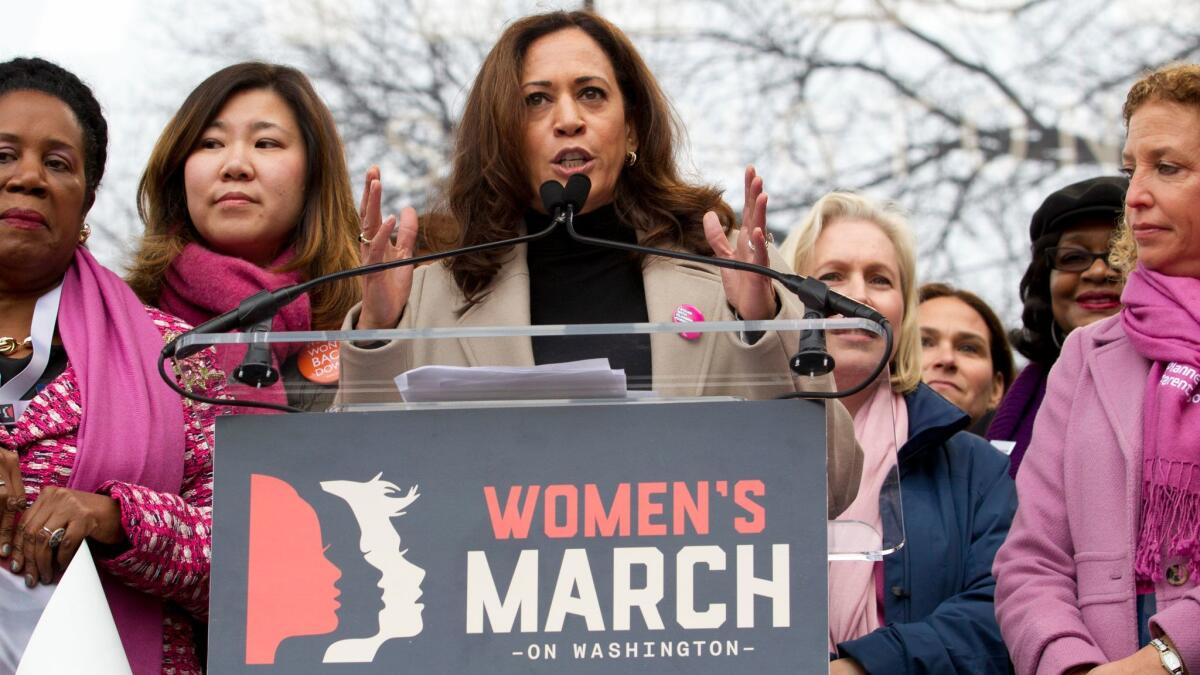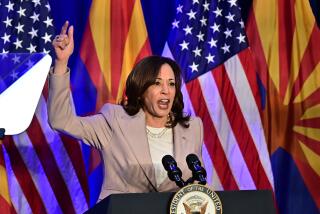Column: Patt Morrison asks: California Senator (and 2020 presidential contender?) Kamala Harris

The last votes were still being counted in California last November, and the political gurus were already talking about seeing Democrat Kamala Harris’ name on a 2020 “for president” bumper sticker. The state’s former attorney general has been California’s junior U.S. senator for only a month, and already she’s been navigating through the most contentious presidential debut in modern times. Harris has also been out, outspoken and visible. She ran into her mother’s best friend at the January women’s march, and on Monday, protesting what she called a “Muslim ban,” she joined protesters in front of the White House. Since this interview, she’s pledged a “no” vote to President Trump’s Education secretary nominee, and more cabinet votes are yet to come. Nothing like plunging right into the deep end.
CLICK HERE TO LISTEN TO THIS INTERVIEW ON THE ‘PATT MORRISON ASKS’ PODCAST »
What about the events of this weekend
This administration, in its first 10 days, has shown that this president has no desire to reach out and work with anyone to make progress.
Just think about the last 10 days: He has threatened healthcare for millions of Californians, much less tens of millions of people around the country, in terms of his desire to repeal the Affordable Care Act. This action [last] Friday has created incredible uncertainty and pain for refugees who are trying to flee harm. He wants to stick taxpayers with the tab for a border wall. He has implemented measures that will make it difficult for women to access healthcare around the world with this global gag rule.
He is doing exactly what he told us he would do. You know, you’ve got to love Maya Angelou. She said it years ago — you’ve got to listen to people when they tell you who they are the first time. He told us who he is. Some people wanted to dismiss it as campaign rhetoric. Well, it turns out it wasn’t just campaign rhetoric. He meant it, and he’s doing it.
And that means we have to fight, and we have to stand up. And we have to fight for the best of who we are as a country.
What does that mean for Senate Democrats? Do you fight on every front or do you pick your battles?
I think that where we can work together we should do that but on these issues I see no opportunity to work together: I refuse to work with an administration that’s going to shut our borders to people who are fleeing harm. I refuse to work and cooperate with the idea that we are going to break our promise to the tens of thousands of “Dreamers” who we promised, if you sign up for this, we will defer deportation and we will not share that information. I don’t plan on going back on that word. We have to keep our word.
There are just some things we cannot cooperate on when the premise and the starting point are so utterly unreasonable, not to mention probably in some of these cases unconstitutional.
Does that mean unless “X” is changed, you and maybe some of your Senate colleagues will simply say no to whatever comes down?
So far, yeah. So far I’m saying no — simply, no. Let’s look at the issue of what we’re doing around repealing the Affordable Care Act without any plan for replacement. I’m not going to work with repeal without replacement. There is no way that we can work with an administration that is going to shut off borders to immigrants, period, because they come from Mexico. I can’t work with that. Can’t work with anyone who’s going to deny that climate change is a scientific fact.
Where we can work together I hope to do that.
You talked to Homeland Security secretary John Kelly and said this [travel ban] goes against our values. What did he say?
I’m not going to talk about the details of my conversation with him, but I will tell you that the bottom line is that I insisted that we would comply with the court order.
There are three court orders at this point: Collectively they have ordered a stay on the executive order. However, the Department of Homeland Security continues to detain people, which is in violation of that stay.
The second is an order that the Department of Homeland Security release the names of anyone who can be impacted by the order. The Department of Homeland Security has failed to comply with that.
And that’s outrageous. It’s a court of law. Courts of law in the United States of America have issued rulings based on the Constitution, based on the law. And those rulings must be complied with. And failure to do so, in my opinion, invites sanctions.
Want to talk about sanctions? As a lawyer, as a former attorney general of California, when you fail to comply with a court order, there should be some kind of repercussions.
People have talked already about a constitutional crisis this early. Do you see that?
I think we could be headed toward a constitutional crisis, certainly. It’s about the fundamental principles that were the basis for the founding of our country. Those words spoken in 1776, that we are all and should be treated as equals — those words that were behind freedom of association, freedom of religion. We have to fight for who we are as a country. And this administration is veering away from all of those fundamental principles, ideals that make us great. This is a time to fight for the ideals of our country. I say that fight we must. You want to talk about make America great again? The way you make America great is you fight for our ideals. And right now our ideals are under attack.
You’re on the Homeland Security and Government Affairs committees, the select committee on intelligence. What would you like to see your committees do vis a vis the question of Russian involvement in the election?
What we need to do through the select committee on intelligence in terms of a thorough and fact-based investigation on the role that was played in our elections. As the intelligence community has concluded, Russia deliberately attempted to undermine public faith in our democratic process. That should be something that causes everyone in our country concern.
Nominees for cabinet positions still must be confirmed. Talk about who you have voted against and why.
Off the top of my head, the list of nominees that have come before me in terms of my committees have included [Mike] Pompeo, who has been confirmed as the new director of the CIA. I did not vote in favor of his nomination. We also had before my committee Gen. Kelly for Department of Homeland Security. I voted against his nomination for a number of reasons, but specifically because I asked him a number of times in various ways on the record to indicate that he would honor our country’s promise to the DACA kids, our “Dreamers,” and he failed to commit to keeping our promise and I could not vote for his confirmation for that reason.
Scott Pruitt has been up for head of the EPA, and I ask him very pointed questions about his belief in the science of climate change, and also if he would honor California’s laws where we have received exemptions from federal standards, because our standards are higher — and he could not make a promise to me that he would comply with those going forward.
What about Steven Mnuchin, the Goldman Sachs executive and Treasury secretary-designate? Your attorney general’s office here declined to sue him over his OneWest bank and its foreclosure practices.
We are hearing from a lot of Californians about that. I intend to definitely do a critical analysis of him as a candidate. California was hit harder than any state in terms of the numbers on the foreclosure crisis. I’ve traveled up and down the state meeting with homeowners who lost their homes and were horribly impacted by that crisis. And I’m concerned about and critical, frankly, of what his role might have been in that process.
Some of your Republican colleagues have denounced the idea of reintroducing torture, and parts of the travel ban. Sen. John Thune said the torture ban is “settled law,” and Sen. Jeff Flake says it’s unacceptable when even permanent legal residents are turned away. Is this perhaps an opening to a realignment of alliances that is not Republicans versus Democrats, but one branch of government, the legislative, standing in opposition to another, the executive branch?
I think you’re presenting a really interesting possibility. I’ve been heartened to see in the last few days that some prominent Republicans have spoken out: John McCain, Lindsey Graham have been I think quite honest and courageous.
Some of these issues really are about who we are as a country and they shouldn’t be thought of as partisan issues. Certainly it would be wonderful to get to a point where Democrats and Republicans can stand together in solidarity around the importance of certain principles, and the ideals of who we are as a country which should transcend party affiliation or any one administration.
That would be I think a very strong statement to the people of our country and the people around the world that we have certain lines that when they’re crossed we’re all going to stand together, regardless of party affiliation.
President Trump’s nominee for the Supreme Court won’t be happening until after you and I talk, but are there any guidelines you have in mind as far as confirmation or rejection are concerned?
As a former attorney general of our state, I actually had a role and responsibility to review the governor’s appointment of judges and members of the judiciary. Based on my experience of doing this, I’m going to look at the nominee’s background, both in terms of life experience, in terms of any opinions they have written and what they have written, and their orientation in terms of the issues.
I am certainly going to look at where they have taken a position on issues like choice and Roe v. Wade, issues like immigration and DACA, issues like climate change, issues that relate to collective bargaining rights, issues that relate to financing elections and Citizens United.
Here’s the one thing I know: had the United States Supreme Court not decided Brown v. Board of Education, I would not be on the phone with you right now. I would not have been district attorney of San Francisco, or attorney general of California.
The decisions that are made by the United States Supreme Court have a profound impact in real lives in a very substantial and significant way. I can think of nothing more important than the importance of evaluating the nominees for United States Supreme Court, and weighing in in a very loud and strong way, because whoever ends up on this court could have impacts on our country for generations, truly for generations.
After the Nov. 8 elections, the Democrats were gobsmacked by the results. What does it say about the state of the party that, within a week or two of presidential election 2016, your name was being bandied election for the presidential election of 2020?
There was a lot that happened during the course of the election. I’ll leave it to the pundits to analyze exactly what it all meant.
But in terms of the state of the Democratic party, I strongly believe that the commitment that we are all making as we go forward post-11/8 — which is what I call it — in this post-11/8 world, we have to recommit ourselves to some of the fundamental principles and priorities of the Democratic party, including coalition building, which means bringing all of who we are as Americans together, by bringing together Latinos and African Americans and women and people who care about choice and people who care about the environment and people who care about labor and people who care about children’s issues.
When people wake up at 3 o’clock in the morning concerned about something, it is never through the lens of them being a Democrat or a Republican. In fact, it always has something to do with their health, the health of their children, can they keep a roof over their heads, are they going to be able to retire with dignity. We’re going to have to get back to really all of us remembering that, and we have to speak to where they are, and we have to see them and understand the lives they are actually living.
So why your name in that context?
I don’t know why my name is in that context. I’m focused on being the junior senator from California and very proud to be representing our beautiful state.
Did you have any advice for your successor as attorney general, Xavier Becerra, apart from things like, Don’t open the window after 4 o’clock because the traffic noise is terrible?
We’ve had many conversations and meetings. And again, in this post-11/8 world, the role of the attorney general of California, as it’s always been, is going to be about being a voice for California, but also a voice for the country around all of these issues that we’ve discussed, whether it be immigration, whether it be criminal justice reform, whether it be climate change. All of those responsibilities rightly fall on the shoulders of the attorney general of California.
You were a college intern mail clerk in the office you now work in. This is like Hollywood — the mailroom to the executive suite.
I was a sophomore at Howard University and I applied with a lot of kids to be what was considered a really prestige job, to be a summer United States Senate intern. And I got accepted. I started by working in the mailroom of then-senior senator from California, Alan Cranston. And who’d-a thunk it: I am now the U.S. senator from California.
Follow the Opinion section on Twitter @latimesopinion or Facebook
More to Read
A cure for the common opinion
Get thought-provoking perspectives with our weekly newsletter.
You may occasionally receive promotional content from the Los Angeles Times.







